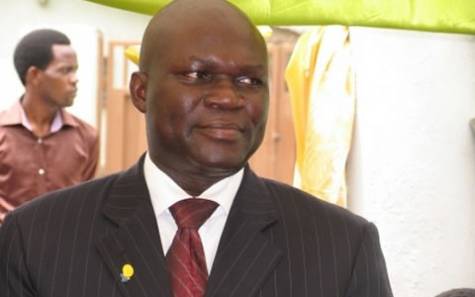Dear Editor, NatGeo: I am a great fan of your magazine, National Geographic, and your sister platform, National Geo Wild, and your coverage of natural history, particularly the behaviour of animals in the wild. I must commend you and your organization for the high level of commitment, attentiveness to details and professionalism consistently and habitually displayed in your various reports both in print and the broadcast form. As a journalist of many years standing myself, I will like to suggest to you and your various channels, a story idea that you may probably find interesting, for professional reasons and for reasons of corporate social responsibility. Kindly pardon my presumptuousness in this regard, but I crave your understanding. Knowing how busy your schedule is likely to be, I will try to be quick and as specific as possible.
This is about my country, Nigeria, a land of over 900, 000 sq. kms., with rich biodiversity and ecosystem, and definitely the largest market for both human and natural resources in Africa. Since May 2015, when a new government took over power at the centre in our country, I have observed a curious and intriguing change in the behaviour of animals in Nigeria, suggestive of a certain transmutation, or perhaps transformation within the animal ecosystem, resulting in patterns of behaviour and interaction that may be of interest to your readers and viewers.
The most recent incident in this regard and the trigger for this letter is the current news in Nigeria about how a snake, described as a mysterious snake, has reportedly swallowed a sum of N36 million ($100k) belonging to the Joint Admissions and Matriculation Board (JAMB). JAMB is the national regulatory body in charge of admissions into tertiary institutions, very much like UCAS in the United Kingdom. This incident occurred we are told, in the process of the attempt by JAMB to audit the accounts of its zonal headquarters. In Makurdi, one Ms. Philomena Chieshe who has now been suspended, allegedly could not account for the said N36 million, being part-proceeds from the sale of forms for students seeking university admissions. When interrogated, she reportedly said her maid had confessed to the missing money having been taken by a mystery snake.
As a media channel that reports animal behaviour, this must be of great interest to you. I don’t know whether this happens in other parts of the world, but here in Nigeria, we now seem to have a variety of snakes that are attracted by the smell of raw cash, and which feed on vaults and bags of money. A documentary on this new variety of snakes, and a proper documentation of the genus and peculiarities would be good for filming. What exactly does the smell of national currency do to snakes? How nutritious is paper currency to snakes? The JAMB Registrar, Professor Isi-aq Oloyede who has turned JAMB, for the first time in its existence, into a revenue-generating body by plugging all loopholes within the system, and without increasing any fees, is insisting that this is a case of corruption and that he will get to the root of it. The Professor probably may not understand the way of snakes and the new variety in Nigeria. He is a good man and I like him. I wouldn’t want him to be bitten by snakes.
Your investigative intervention should assist him. Your experts and investigators can deploy the tools of science and investigative journalism to seek out these snakes and catch them in action, and document for your numerous patrons, this new scientific development. Right now in Nigeria, we are preparing for the general elections scheduled for 2019. We need information and knowledge because if the Makurdi snake gets away with the N36 million, the same snake and its family could return in 2019 to swallow ballot boxes and papers and thus compromise Nigerian democracy.
I am, however, tempted to believe that the snakes in Makurdi may have become quite audacious, in reaction to a recent declaration, under this same political administration, by a high-ranking state official, that he bought two houses in Dubai from the sale of snakes! Are snakes vengeful? Is this nemesis? Do they resent being sold for profit? Do snakes have the capacity to feel and settle scores? Could the sale of snakes, with the profit of houses in the UAE by a senior official, have motivated some snakes in Benue state to swallow money meant for the national treasury? What does the process of swallowing, and the digesting of money by snakes entail? Many young Nigerians and I believe other persons across the world will learn a lot from this.
I, therefore, hope you will consider this a very urgent subject for your consideration and editorial intervention. Sir, the truth is that animals all over Nigeria are growing and becoming wild. They have no respect anymore for Nigeria’s constituted authority. We could wake up one of these days to hear that elephants have invaded the Central Bank of Nigeria, and swallowed all the bank’s vaults, leaving the entire country impoverished. The way things are, nobody will be surprised. I am sure you would not want that to happen, considering Nigeria’s strategic importance and population. If that were to happen, neither Africa nor the West would be able to handle the natural and humanitarian crisis that would ensue. And if that were to happen, I am sure you will not want to miss the story.
I made the point that Nigeria has become such a wild zoo where the animals no longer respect constituted authority, and where there seems to be a conflict of roles between animals and human beings. Let me elaborate a little. Every year, Nigeria holds what is called Armed Forces Remembrance Day on January 15. One of the highlights of the event is the release of pigeons by the President at the end of the ceremony to symbolise the release of peace upon the land. I became really worried about the Nigerian animal kingdom when in the last three years, the pigeons released by the President simply refused to fly. Government officials shouted at the pigeons to fly. Some waved their hands and even tried sign language. Some professional sycophants flapped their arms like birds to guide the pigeons. But no way! The pigeons just jumped onto the floor and behaved as if they were having an evening-time promenade.
When you focus on birds on NatGeo Wild, the birds are shown flying. What’s going on here then? Why are some birds in Nigeria refusing to fly? The President of Nigeria is the most powerful man in the land. When he asks human beings to jump, they actually do more than jump; they make an effort to somersault. But birds, common birds, are defying Presidential orders. What kind of birds are these? A deaf and dumb specie? Or are they resisting being used as symbols of peace? Is it possible that birds have witchcraft? – because since those birds refused to fly, Nigeria has not known peace.
I began to suspect that something was indeed terribly wrong with the animal kingdom in Nigeria when sometime in 2017 rats invaded the President of Nigeria’s office! These criminal rats chased the President out of his office for more than a month. They tore the furniture in his office apart, littered the place with their droppings and disrupted Presidential work. I am not making this up. The Nigerian Presidency issued an official statement to this effect. Your publication and the Nat Geo Wild Channel missed the story, quite, unfortunately. But you have a second chance. You can do a good story, investigating the furniture-eating rats in Nigeria’s Presidential Villa. The President has since returned to his office, but what if the fangled-teeth rats are still around the place? What else will they eat? Having eaten up the President’s furniture without consequences, or implications, they may most certainly, just decide to munch the country’s security vote and foreign reserves! This then, is a matter of national security. If your cameras can just unmask these disrespectful rats, that will be the story of the decade.
To NatGeo: A Story Idea On Nigerian Animals By Reuben Abati





